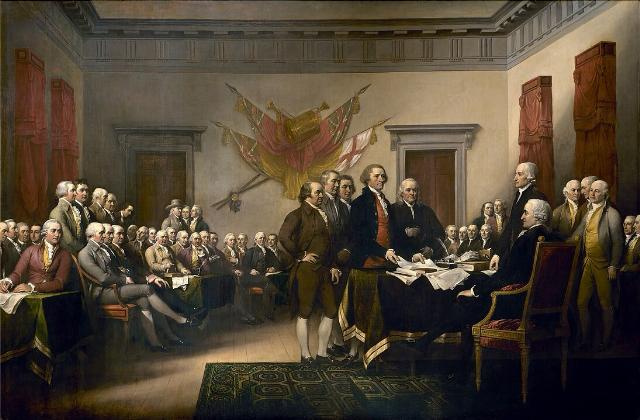The triad of liberty
In these times of political polarization, where ideological rifts threaten to cleave the very fabric of our society, we often search for historical precedents to guide our path forward. The founding fathers, especially the triumvirate of George Washington, Thomas Jefferson, and Benjamin Franklin, offer not only inspiration but critical lessons for today’s conservatives and indeed, for all Americans.
The American Revolution, a crucible that forged a nation, was steered by these men, whose personal and political relationships illuminate a path through our current discord.
George Washington, revered as a unifying figure, demonstrated a leadership style steeped in stoicism, duty, and the concept of a united front against external threats. His refusal to become America’s king, choosing instead to retire after two terms, established a cornerstone of American democracy: the peaceful transfer of power. In our era, where political offices are treated as personal fiefdoms, Washington’s model of leadership serves as a stark reminder of what true statesmanship entails. Conservatives today should champion this model, emphasizing duty to country over personal ambition, promoting leaders who seek to unify rather than divide, even amidst fierce political competition.
Thomas Jefferson, the architect of liberty, penned words that continue to echo through time. Yet, his life presents a paradox: a champion of freedom who did not extend these rights universally in his practice. This contradiction teaches us a valuable lesson about the ongoing nature of the American experiment. Jefferson’s vision was not static but evolving. Conservatives, while often accused of clinging to the past, must remember that the principles Jefferson espoused require continual re-examination to ensure they serve all citizens, not just a select few. This isn’t about rewriting history but rectifying its course, acknowledging past errors while pushing forward with the core values of liberty and equality.
Benjamin Franklin, the quintessential American, was a master of compromise, diplomacy, and innovation. His ability to navigate European courts for American aid showcases the importance of strategic patience and adaptability in politics. In today’s hyper-partisan environment, Franklin’s pragmatism is a beacon. Conservatives, often criticized for inflexibility, could learn from Franklin’s willingness to engage in dialogue, to find common ground where none seems to exist. It’s not about diluting one's principles but finding ways to implement them effectively through cooperation and understanding.
From a conservative perspective, these leaders embody the virtues of self-reliance, limited government, and individual liberty. However, their lives also offer a critique of conservatism’s potential pitfalls.
Balancing tradition with progress. While conservatives cherish tradition, the lives of Washington, Jefferson, and Franklin illustrate that tradition must evolve. They didn’t cling to British rule; they sought to improve upon it. Today’s conservatism must similarly evolve, adapting to new challenges while preserving core values.
The role of statesmanship. Washington’s leadership style suggests that true statesmanship is about rising above partisan bickering for the common good. This is a call for conservative leaders to prioritize national welfare over party lines, fostering a climate where debate is healthy, not hostile.
The value of intellectual engagement. Jefferson and Franklin were intellectuals whose contributions went beyond politics. Conservatives should not shy away from intellectual engagement but should lead in areas like education, science, and diplomacy, areas where these founders excelled.
The relationships among these men were complex, often fraught with personal and political tension, yet they managed to work towards a common goal. This synthesis of their personal virtues and political ideals could be a blueprint for today.
Unity Over Division. Emphasizing what unites us as Americans, focusing on shared values rather than divisive issues.
Intellectual Leadership. Encouraging a renaissance in conservative thought, where ideas are not just defended but developed, in line with Jefferson’s and Franklin’s lifelong learning.
Pragmatic Leadership. Adopting Franklin’s approach to find practical solutions to contemporary problems, advocating for policies that can garner bipartisan support.
Moral Consistency. Confronting contradictions within our history and current policies, striving for a consistency with our founding principles, much like Jefferson’s later reflections on slavery.
In conclusion, the legacies of Washington, Jefferson, and Franklin are not relics to be revered from a distance but living lessons. For a conservative movement that often looks to the past for guidance, these founders offer a nuanced approach: to honor tradition not by preserving it unchanged but by using it as a foundation for innovation and moral progress. As we navigate the choppy waters of contemporary politics, let us draw from their wisdom, striving for a conservatism that is both rooted and forward-looking, embodying the spirit of those who first envisioned this great nation. This isn’t just about conserving; it’s about advancing with purpose, guided by the stars of liberty, unity, and intellectual vigor set by the founding triad.

Image: Public domain.
FOLLOW US ON
Recent Articles
- Righteous Attacks Bringing the Left to Heel
- The 250th Birthday of Patrick Henry’s ‘Liberty or Death’ Speech
- Iranian Regime’s Nuclear Crisis and Diplomatic Tensions: Negotiation or Confrontation?
- Iraq’s Debt to America: It’s Time to Collect
- Mahmoud Khalil: The Lawfare Circus Delayed, but the Show Must Go On
- The Bible in Schools? Research Says it Matters
- Getting Back to Serving Humanity
- Whitewashing the Democrats' Fence
- Adventures in Politics: When I Was An 'Autopen'
- Reclaiming Control of America’s Immigration System
Blog Posts
- Bernie's astroturf rally
- Remembering an inspiring story about Sir Michael Caine
- Are Turkish President Recip Erdoğan's days numbered?
- Leftists are finally embracing their Inner Fascist
- In praise of Elon Musk
- For 47 years, I’ve dreamed of what Trump is doing now
- Tim Walz, Minnesota’s manic Marxist governor, has the reverse Midas touch
- Democrats’ ambivalence about healthy authority in America
- The Department of Education: A perspective from 1979
- How much did Joe know?
- President Trump and unitary power
- Was there really a measles death in Texas?
- When silence is permission
- The FBI flees the FBI
- Think USAID was bad? You ain't seen nothin' yet.






